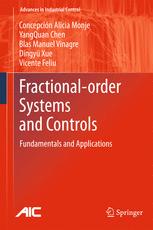

Most ebook files are in PDF format, so you can easily read them using various software such as Foxit Reader or directly on the Google Chrome browser.
Some ebook files are released by publishers in other formats such as .awz, .mobi, .epub, .fb2, etc. You may need to install specific software to read these formats on mobile/PC, such as Calibre.
Please read the tutorial at this link: https://ebookbell.com/faq
We offer FREE conversion to the popular formats you request; however, this may take some time. Therefore, right after payment, please email us, and we will try to provide the service as quickly as possible.
For some exceptional file formats or broken links (if any), please refrain from opening any disputes. Instead, email us first, and we will try to assist within a maximum of 6 hours.
EbookBell Team

4.0
26 reviewsFractional-order Systems and Controls details the use of fractional calculus (calculus of non-integer order) in the description and modeling of systems, and in a range of control design and practical applications. It is largely self-contained, covering the fundamentals of fractional calculus together with some analytical and numerical techniques and providing MATLAB® codes for the simulation of fractional-order control (FOC) systems (available by download from www.springer.com/ISBN). The use of fractional calculus can improve and generalize well-established control methods and strategies. Many different FOC schemes are presented for control and dynamic systems problems. These extend to the challenging control engineering design problems of robust and nonlinear control. Practical material relating to a wide variety of applications including, among others, mechatronics, civil engineering, irrigation and water management, and biological systems is also provided. All the control schemes and applications are presented in the monograph with either system simulation results or real experimental results, or both. Fractional-order Systems and Controls introduces its readers – academic and industrial control researchers interested in mechatronics, nonlinear and robust control, and applications fields from civil engineering to biological systems – to the essentials of FOC and imbues them with a basic understanding of FOC concepts and methods. With this knowledge readers can extend their use of FOC in other industrial system applications, thereby expanding their range of disciplines by exploiting this versatile new set of control techniques.